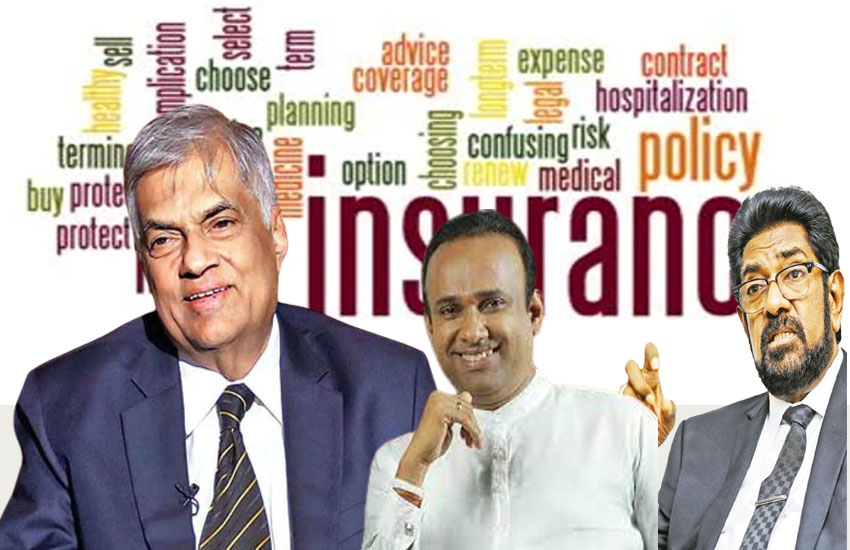At the crux of the problem, at least for the ‘ruling’ Sri Lanka Podujana Peramuna (SLPP), is not Pathirana’s appointment as Minister of Health. The son of former Minister of Education Richard Pathirana, he is one of the few politicians in the party to command some respect both from his colleagues and the public.
In allocating the Health portfolio to Pathirana, Wickremesinghe had to relieve him of one of the other two portfolios he held, lest he be burdened with three key ministries. Therefore, the Plantation Industries portfolio was handed over to Mahinda Amaraweera, who is also the Minister for Agriculture, a seemingly logical allocation. There was a problem, though: Amaraweera was not from the SLPP but from the Sri Lanka Freedom Party (SLFP).
Soon, the SLPP was up in arms. Its General Secretary Sagara Kariyawasam took to the media to remind Wickremesinghe that it was the SLPP votes that made him President and that the party deplored the removal of a portfolio from the SLPP, while handing it over on a platter to the SLFP.
That this was not merely a personal bee in the bonnet for Kariyawasam was apparent when the next person to chide Wickremesinghe was none other than Namal Rajapaksa, the heir apparent to the SLPP leadership. The younger Rajapaksa showed his immaturity when he tried to teach a lesson in coalition politics to Wickremesinghe, saying that the President should have consulted partner parties before changing portfolios.
Wickremesinghe has not made any public comments on the issue despite the very public criticism of his actions by the SLPP. Batting on his behalf instead was SLPP parliamentarian and now Wickremesinghe’s confidante, Nimal Lanza, once the protégé of Basil Rajapaksa. Yes, it is the same Lanza who was visited by none other than then President Mahinda Rajapaksa when the former’s home was raided by the Special Task Force.
Lanza made it a point to tell the media that Namal Rajapaksa was ‘like a kitten’ when Gotabaya Rajapaksa reshuffled the Cabinet not once but twice in two months and booted out all the Rajapaksas in it, but is now ‘barking’ about a minor reshuffle. If the SLPP had a problem about the President, they can bring the government down by defeating the upcoming Budget and go for a general election, Lanza challenged.
If he cares to listen to all this high decibel noise emanating from the SLPP, Wickremesinghe must be chuckling to himself. Having first presided over the destruction of his own United National Party (UNP), he is seemingly creating rifts within the SLPP. Or, is he, really?
To analyse this issue, the ground realities of the current political situation must be examined closely. The fact that the SLPP supported Wickremesinghe for the Presidency was predicated on two issues: Firstly, the SLPP couldn’t forward a candidate of its own because of the party’s level of unpopularity in July 2022. Secondly, of the potential candidates, only Wickremesinghe, starved of the Presidency after 45 years in politics and wanting it desperately, was agreeable to ‘doing a deal’, vis-à-vis protecting the Rajapaksas and, by extension, the rest of the crooks in the SLPP, were he to assume power.
This was the basis of the SLPP supporting a man they ridiculed, lampooned, humiliated and reviled for decades. It was a political ‘marriage of convenience’, nothing more, nothing less. More importantly, as matters stand today, these two factors are still valid, so this marriage is set to continue.
The day the SLPP finds a suitable alternative that they can safely present to the electorate, or the day Wickremesinghe decides to prosecute instead of protect the Rajapaksas, this marriage will end. As far as we can see, that has not happened yet. So, for all the egg on the collective faces of Kariyawasam, Namal Rajapaksa and Lanza, Wickremesinghe will continue to govern with the SLPP for the foreseeable future.
In the meantime, it is true that Wickremesinghe is actively cultivating the goodwill of handpicked SLPP members. They include younger ministers such as Kanchana Wijesekera and Pathirana as well as some state ministers who are getting a taste of acting autonomously instead of having to be under the yoke of the Rajapaksas. Wickremesinghe’s choices for such special treatment is not based on merit or integrity: just as much as it includes Pathirana, it includes the likes of Lanza and Prasanna Ranatunga!
This is Wickremesinghe’s way of buying an insurance policy. His own UNP is still to awake from the coma it was sent into by voters in August 2020, so he recognises the value of politicians with clout in their electorates and a ‘name recognition’ factor nationally, especially as he prepares for a presidential election.
Wickremesinghe will, of course, try and tap in to the SLPP machinery and grassroots network if that party still supports him by this time next year. The cultivation of a clique of SLPP members loyal to him is his way of telling the SLPP that if he does not have their support, he will go his own way- but at the same time take a sizeable chunk of SLPP stalwarts with him.
So, what must we make of the hullabaloo within the SLPP? Does it signal a serious, fatal rift within the SLPP? Does it also mark an irreversible deterioration in the relationship between Wickremesinghe and that party? No, certainly not.
Wickremesinghe’s politics and, happily for him, the SLPP’s politics are not clouded by issues such as policy, principles, ideology or integrity. So, they can continue to work very well together even at the next elections as long as their interests are the same- which is to remain in power- and as long as the SLPP cannot find a candidate of their own with winning potential.
Kariyawasam, Namal Rajapaksa and Lanza can have their say but finally, Wickremesinghe will have his way.





